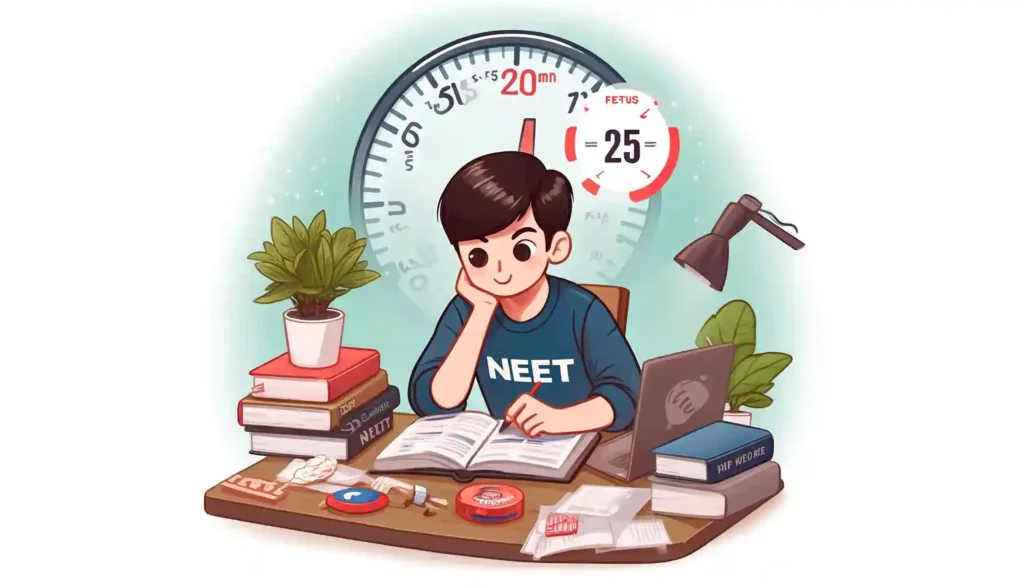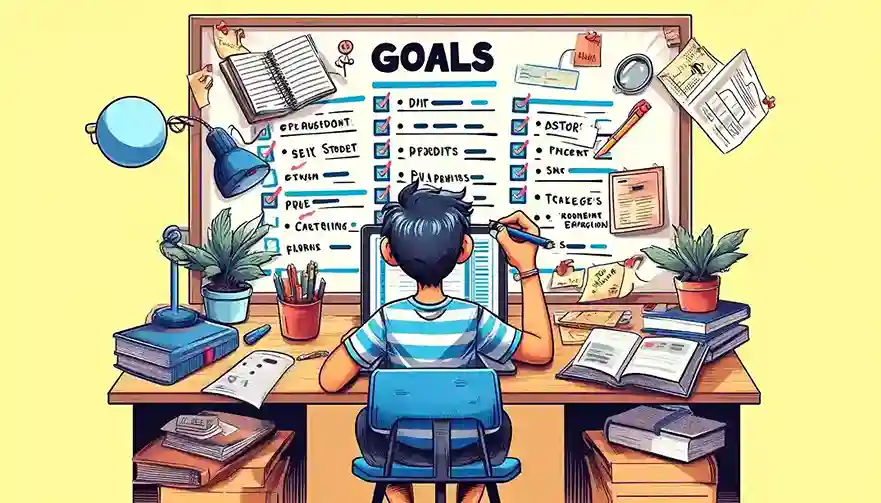How to study for 15 hours without feeling burnout?
Hello future docs. Burnout is one of the most common problems faced by NEET aspirants and even medicos. It’s the long continuous study sessions that make us so prone to being burned out in a while. One of the most common questions we hear is ‘How many hours did you study for NEET?’ and when we answer that question, the question that follows is ‘How did you study for so long everyday without feeling burnout?’
So today I decided to share the hacks that I followed during my NEET preparation and the ones that I still follow in MBBS. These allow me to work for 12 hours a day without feeling burnout.
12 hours! That sounds impossible!

Now, let me tell you an even more impossible thing, it’s actually 15 hours. 12 hours of work in 15 hours of total time. Obviously, I am not a machine, I cannot work 15-hour cycles everyday. But most of my days, I can pull off at least 12 hour cycles at least.
Now what are these cycles that I am talking about? It’s Pomodoro. Pomodoro is essentially a work-rest-work-rest cycle where you usually work for 45 minutes and then take a 15 minute break. I follow the desi version of pomodoro, where I work whenever I want and take a break whenever I want. Most times I skip the 15 minute break, most times I take a 2 hour break instead. But do you know why this desi version works for me? Because I have been a disciplined student for a very long time now.
I used to follow the pomodoro clock very sincerely, with not a minute here or there. I did this throughout my preparation. This led to me becoming so disciplined that now, even without the clock, I can manage my work and rest in the 3:1 proportion.
The rest in between allows me to stretch, to just walk to the kitchen, open the fridge, be disappointed, close the fridge and get back to my desk. I watch a short YouTube video by TedTalks sometimes, or I just doodle on my notebook.
How do I approach these 15 hours?

I make a to-do list the night before. And I allot tasks to time blocks instead of exact hours. An example is, today I had to watch 2 videos of ophthalmology, Read PSM textbook, work on a club project and write this blog. So instead of making a timetable that says ‘9AM – 10AM: study ophthalm’ I gave ophthalmology the morning time, which means 9-12 for me. At 12 I had breakfast, then I gave my afternoon to PSM (because it was bulky). The afternoon means 12-5pm for me. Lastly I had the club project and the blog left for the 6 pm-1 am time block which is my evening.
I give uneven hours to each task because I am most efficient in the morning and least in the evening. You can change your time blocks accordingly and also make them flexible.
When you allot hours, you are putting yourself in danger of what I call the ‘time table domino effect’. In this, when you fail to complete a task within the allotted hour, you get irritated, mess up the next task or completely abandon n it, which leads to messing up the next task in an attempt to complete it faster and so on. One bad task leads to the downfall of the entire time table.
How Do I keep going?

Once I set up a time table I also set up small rewards with each task. Usually, I go on to any social media only after I have completed my morning block and I go for a short walk or go to the gym after I have completed my afternoon block. The days I do not complete my task, I skip these relief activities. This makes me want to complete my tasks everyday as it creates a work-reward loop in my head. This is a short term reward, a small dopamine rush.
Another factor I consider while setting tasks is my long term goals. This year my goal is to get distinction in third year MBBS. So, I try to take a small test at the end of the week to analyse what I have studied over the week and if I have studied it properly.
If I score well, I feel happy with myself and my work and it helps me work more the next week. So there goes a long term reward as well. A bigger dopamine rush, a good secure feeling. This satisfaction with my work is also what keeps me going. Prioritization becomes very important here.
How to keep the tasks interesting?

You should have the weekly task list ready in your mind and you decide the daily task list based on the weekly one. In the example that I cited, I said that I am watching videos, reading, writing, and making a presentation for my club. That’s four different types of tasks. I also have to finish reading a few chapters of ENT and Ophthalmology this week. Had I scheduled these reading sessions today, I would get bored and have to work without being very interested. This would have led to burnout in a week or so.
What are the different types of weekly tasks for NEET that you can schedule in a day? Revision sessions, PYQ solving, Question bank practice, watching lectures on YouTube, attending classes, making notes, Reading the NCERTs. You have to smartly schedule them in a way that your daily timetable does not get monotonous or exhausting. Try to keep a balance between the active and passive learning methods, keep small ‘mnemonic hunting sessions’ where you look up mnemonics to memorize biology and chemistry. You can have a very balanced schedule if you are smart about it.
The most important aspect: What suits you?

Are you a person who is efficient in such long study sessions? Or are the hours getting overwhelming? Do long sessions take away your study quality? Do you perform better with short hours of study? Ask yourself these questions.
If the answer to any of these questions is yes, then you need to really crosscheck your strategy. Why are you trying to fit into someone else’s strategy? There is no minimum daily hour requirement for study that will guarantee NEET success. It is very subjective and varies from person to person. I had a lot of other tasks at home and a lot of backlog from 11th while preparing for NEET, this made me opt for an 8-10 hours study schedule. You can very well opt for a 5-7 hours study schedule as long as you are consistent. Do you personal best and look after your efficiency. You NEED to identify your study patterns to make sure you do not get burned out because of the wrong strategy.
What everybody needs.
The study schedule is different for everybody but one necessity remains constant: Breaks.
Breaks should actually be breaks. Are you scrolling away the rest of your time? Or are you doing something fulfilling. Social media is not just a problem during NEET, it is a lifelong problem. Are you one of the people who wants to give their youth away to social media? Or are you one of the guys who has enough self control to give it up and work for a lavish life? Decide for yourself.

If you are taking a break it needs to be something that is actually putting your mind to ease. ‘Humans are social beings’ we have all heard this statement, right? So, work according to it. Go talk to your parents or your siblings in your break time. Call a friend. Sit with your grandparents. Go sit in the garden. Go on a walk. Paint. Sketch. Write. Cook. Do whatever you like, don’t waste your time scrolling. You need to make sure your body feels rested and happy. You are just confusing your mind with random information on social media.
Go outside for at least a walk once a week. Go for a family dinner or an outing with your friends once a month. Staying in the same location makes it very difficult to keep working. You can try to alternate your study space once in a while by studying in a public library or in your friend’s house. Just be consistent.
So, what is the plan?
So, these are the steps that you should follow to avoid burnout during long study sessions.
- Write down all the tasks that you have to complete in a week.
- Then assign them to the days of the week. Consider your class/college timings and also try to allot a good blend of activities to each day.
- Make sure that each day has been allotted an active learning method.
- Every night before you sleep, plan out the schedule of the next day.
- Allot tasks to time blocks instead of exact hours. And keep a small reward after each time block.
- You can use Pomodoro apps to maintain a consistent study session.
- Do not go to social media during break time. Do something fulfilling instead.
- At the end of the week, take a test that is consistent with your long term goals.
- Have a change of space once in a while, go out often.
Last piece of advice would be:
Don’t obsess over long study hours. It’s okay if you are studying for only 3 hours someday. As long as you are consistent with your study, you will do well. I have enjoyed my first and second year in Mumbai, I have explored the city entirely. The only thing that makes up for the time I spend having fun is my consistency. Even one hour a day is enough on some days. Any question that you have is welcome. Just comment below in the chat box. I hope that you can study for a little longer next week. Remember, small steps.
ALL THE BEST






